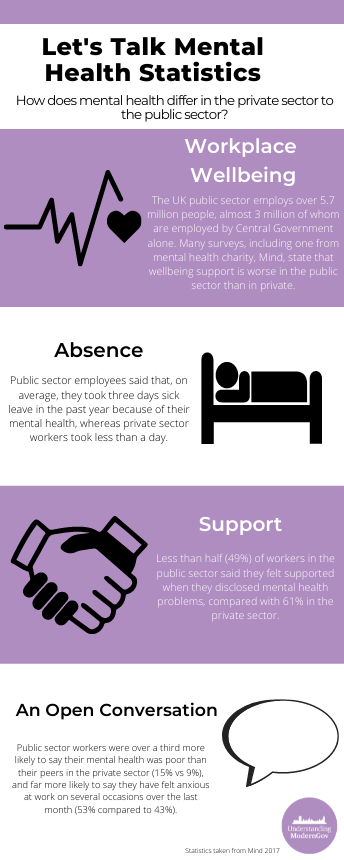Time To Do Better? Improving Mental Health in the Public Sector
Do you work through lunch? Work later than you usually do? Eating quickly while your phone is buzzing?
The chances are, all of us will have experienced moments of stress at work. For many, stress can feel like the jolt we needed to spring us into action and complete a task we may have been putting off.
And yes, it’s true. A moderate level of stress has been shown to improve performance levels in many scenarios...We’ve all come into contact with the adrenaline junkie who seems to live for stress. The cliff-diving, off-piste skier that swam with sharks last year and hasn’t stopped going on about it.
But there’s a more serious side to stress and employers are beginning to pay attention.
Why is Stress at Work Bad?
Stress over a long period of time is unhealthy. Prolonged and excessive stress can cause illness, exhaustion or further psychiatric problems. It’s not surprising that nearly a third of fit notes issued by GPs are for psychiatric problems, according to a recent NHS report.
It is reported that 70 million work days are lost each year due to mental health problems in the UK and this costs employers a staggering £2.4 billion per year.
With such costs and legal obligations, it’s easy to see why employers are taking workplace mental wellbeing seriously. It is becoming even more pivotal that all organisations develop a proactive approach to improving workplace mental health.
Why a Strong Mental Health Strategy is Important in the Public Sector
Employee mental wellbeing should be a priority for every organisation. The average UK employee spends 35 hours per week at work, which is a fair amount of time being spent in the office and may feel even longer if you feel like your mental health is not being adequately supported in the workplace.
Work-related stress can have a significant impact on your employee's mental health. Being able to recognise the signs of stress and the triggers in a work environment is critical in understanding how to give the right support.
While there is more conversation around mental health and the stigma surrounding it than ever before, we still have a long way to go with ensuring that wellbeing strategies are being effectively implemented in the workplace.
What are the Problems of not Having a Mental Health Strategy?
Lack of support
Understanding how to speak to employees about mental health can be challenging for managers who may not know how to approach the topic sensitively. Having a solid strategy in place such as knowing how to monitor your team’s wellbeing, looking for any changes in behaviour and opening up the dialogue for disclosed conversations can enable you to become a mental health leader in the workplace.
Lack of presence
Mental ill-health is the leading cause of sickness absence in the UK, costing organisations an average of £1,035 per employee per year (Time to Change). Having a work environment where employees feel comfortable to be open about their mental health and ask for help could prevent long-term absences in the workplace.
Lack of trust
If your employees feel like they can’t trust you, it’s very unlikely that they will open up to you if they are experiencing low mental health. By creating a culture of trust and enabling employees to feel like they can express how they’re feeling in a safe and understanding environment, the more the stigma around mental health in the workplace can be reduced.
Having an awareness of mental health in the workplace requires a level of understanding in emotional intelligence. By recognising key elements of emotional intelligence (EI) including self-management, social awareness, empathy and how to respond to emotions, you can increase the morale and productivity of your team by incorporating these into a strategy.
Are you a public sector worker? Here's 5 ways you can maintain your mental health.
Public Sector vs. Private Sector Mental Health - The Statistics
Workplace Wellbeing
The UK public sector employs over 5.7 million people, almost 3 million of whom are employed by Central Government alone. Many surveys, including one from mental health charity, Mind, state that wellbeing support is worse in the public sector than in private.
Absence
Public sector employees said that, on average, they took three days sick leave in the past year because of their mental health, whereas private sector workers took less than a day.
Support
Less than half (49%) of workers in the public sector said they felt supported when they disclosed mental health problems, compared with 61% in the private sector.
An Open Conversation
Public sector workers were over a third more likely to say their mental health was poor than their peers in the private sector (15% vs 9%), and far more likely to say they have felt anxious at work on several occasions over the last month (53% compared to 43%).
Share the infographic below on your network or just with colleagues to show how important mental health is in both the public and private sector. Don't forget to tweet us using @UModernGov!
Support Your Employees and Colleagues in the Public Sector
Does your organisation have a mental health strategy in place? Do you want to improve how you support your employees or colleagues with their mental health? Let's get started. Browse our upcoming leadership, management and strategy courses to take the first step.








